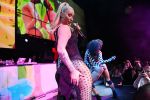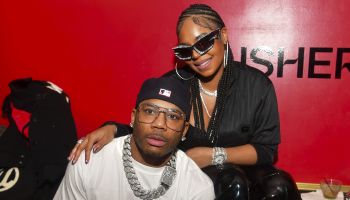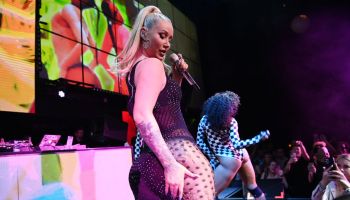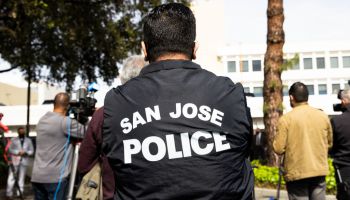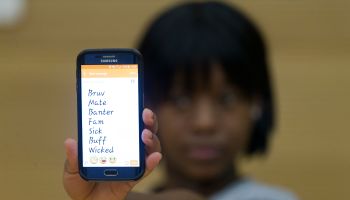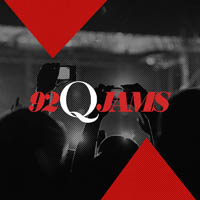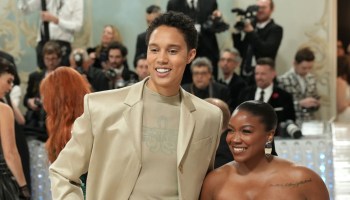CNN’s Wolf Blitzer wanted to focus his interview with activist, DeRay McKesson, on the violence against police in Baltimore. But it was clear DeRay McKesson wasn’t having it. “You’re suggesting broken windows are worse than broken spines,” McKesson shot back in response to Blitzer’s commentary on the “violent riots.”
Sign Up For Our Newsletter!
We had the privilege of speaking to DeRay McKesson about his CNN interview and what he calls the “uprising” of Baltimore on “The Rickey Smiley Morning Show.”
McKesson’s activism started in Ferguson, but doesn’t end in Baltimore. “There’s a Mike Brown in every town and it’s now in Baltimore, my hometown,” he said.
RELATED: The Truth About The Bloods, Crips And Baltimore Riots [EXCLUSIVE AUDIO]
Listen to the audio player to hear McKesson discuss how he got involved in protests, the disparities in white media’s coverage and our broken justice system in this exclusive interview.
RELATED: Baltimore Mom Explains Why She Beat Son In Front Of Cameras [VIDEO]
Check out DeRay’s CNN interview with Wolf Blitzer below, and take a look at the transcript of our full conversation with this impressive voice of Baltimore. Listen to “The Rickey Smiley Morning Show” weekdays from 6-10 a.m. EST to hear more powerful conversations live, and check out our past interviews right here.
RELATED: Baltimore Residents Pick Up The Pieces To Help Following Riots [VIDEO]
RELATED: Baltimore: The Protests, Riots & Aftermath [PHOTOS]
Rickey Smiley: All right, The Rickey Smiley Morning Show, 13 minutes after the hour. Hey, now I don’t know if y’all on Facebook, I’m always on Facebook, and I was on Facebook yesterday, I actually didn’t see the clip when it aired, but I watched most of it. I saw a young man put one of these reporters straight, straighten his ass all the way out. So you didn’t get a chance to see this exchange between DeRay McKesson and Wolf Blitzer, here’s what happened:
Wolf Blitzer: “But at least 15 police officers have been hurt, 200 arrested, 144 vehicle fires. These are statistics. There’s no excuse for that kind of violence, right?
DeRay McKesson: Yeah, there’s no excuse for the seven people that the Baltimore City Police Department has killed in the past year either, right? Hmm?
WB: We’re not making comparisons, obviously we don’t want anybody hurt, but I just want to hear you say that there should be peaceful protests, not violent protests, in the tradition of Dr. Martin Luther King.
DM: Yeah, there should be peaceful protests. And I don’t have to condone it to understand it, right? That the pain that people feel is real. And you are making a comparison. You are suggesting that this idea that broken windows are worse than broken spines, right? And what we know to be true is that the police are killing people everywhere, and that’s real.”
RS: Wow! Did you hear – hey, DeRay?
DM: Hey, I’m here.
RS: DeRay, man. Brother, I just want to tell you, man, like when I saw it on my phone it actually put tears in my eyes to see you get his ass straight. I’m talking about I just threw up open my fist man, like – and you was at the, you know, when all of this stuff was going on in Ferguson as well, right?
DM: Correct.
RS: Hey, so, I mean, tell me a little bit about yourself. What got you involved in these protests?
DM: You know, I originally went to St. Louis to see what was happening. I, like many people, I had seen it on Twitter and Instagram and I got there on August 16th. Mike was killed on the 9th. And I began protesting beca—I called myself a protester after the first night I got tear gassed. And there was this moment where I was like this is not the America I know. That the America that I believed in as a kid just didn’t exist. I mean I saw that when I got tear gassed and when we got shot at with rubber bullets. And it was just because we were upset that the police killed Mike Brown. And that started it. And what I came quickly to realize that police violence is actually like an epidemic across the country, right? That there’s a Mike Brown in every town and that’s real. And it is now in my hometown, my original town, there was where Freddie Gray getting killed. But there’s Rekia, and Ahania, and Tamia and Don, the names just go on and on. I mean, there has been no justice.
Claudia Jordan: DeRay, you were so impressive and, you know, we all were talking about you yesterday in the studio, and you know, there’s nothing more threatening to the media than an articulate, compassionate …
RS: Yes.
CJ: … intelligent black man. And I wanted to get your take on the slant the media was trying to put, and especially in your interview, it was so evident they were trying to lead you down that path to just talk about the thugs, quote/unquote “thugs in the streets”, and you know, just kind of skip over and glaze over the protests and how this all got started.
RS: Sure. No, Claudia, to glaze over the murders. That’s all it is.
CJ: The mur—oh, yeah.
RS: Yeah.
CJ: We’re going to talk about 15 police officers being hurt, and then he brought up the great point, ‘what about the seven black folks that were murdered by the police department.’
RS: Right.
DJ: They can’t go home to their families. So what do you think about the slant?
DM: You know, it’s interesting, I think in white media spaces people are used to seeing groups of black people either as entertainers or entertainment spaces, so like sports or things like that, or concerts, or in churches. So when black people come together in a way that white supremacy doesn’t expect then all hell breaks loose. And that’s what you see in protests across the country. You see people come out in the streets and people don’t know how to describe it but in a way that’s negative. I know we’ve been saying that this is community, right? Like protests is confrontation and destruction, but it is also community building. People are coming out in ways that are building like a new political reality. I think about all the people who I didn’t know at all who I trusted with my life because we knew each other’s hearts in earnest. We didn’t know each other’s names, we didn’t know each other’s stories, but we knew that we were all staying on the right side of justice. And I do think there’s something where like America has criminalized blackness. Like to be black is to be a criminal in America. To be a black man is to be a gun, and to be a black woman is to be erased. And that is something that has happened. Now with social media that we get to tell our own stories because black people, our stories are often erased. Either they are literally not told, or they’re told by everybody but us.
RS: Right.
DM: And now we get to fight back.
RS: So, man, I really – like if I had to pick somebody to be our spokesperson for what’s right when it comes to these rights, man, the way you just articulated yourself on the television and you went up against one of the best in the game, and that’s Wolf Blitzer, the way you articulated yourself, man, and got him together, in my opinion, I was just totally outdone, man. I was very, very proud because you speak for people like myself and you said everything that I was thinking and then some. You know, I mean, you really took him to task and put him together. I mean it’s all over Facebook. As a matter of fact we’re going to – people were videotaping you talking to Wolf Blitzer and making videos out of it, and you can hear people like in the background going like, yeah, that’s right, tell them.
DM: (Chuckle)
RS: Have you been getting a lot of phone calls from other people wanting to do interviews?
DM: I have, you know, I think reporters are a little more cautious with me now, which has been an interesting thing. You know, I tell the people that I meet on the street who want to talk about it that like, you know, I’m just one of many voices. There are so many people out there who are pushing good messages around the protests. It will take all of us to win. And that’s real, right? Like the movement is so much bigger than me and bigger than you and bigger than all of us. And that’s the power of this space right now.
CJ: DeRay, you’re out there protesting and doing this for the people. And I know there’s over 230 Baltimore protesters arrested, that are in jail with no formal charges against them, 34 of them are juveniles. Is that discouraging people from stepping forward and getting active? Or is it not?
DM: No, it’s not discouraging people. And 101 people got released yesterday because no charges have been filed and they got released with no charges. But what it highlights, right, is a broken justice system. It’s like what does it mean when you put people in jail, no charges, 24 hours, suspend peoples’ rights to a hearing within 24 hours? So the protests is like confronting and disrupting and exposing sort of the depth of what we face. You know, I say often that like we aren’t saying black lives matters to affirm our lives, we know we matter. We’re saying black lives matter to expose the depth of white supremacy and the evil we face. And like that’s what you see in the court injustice system here that it’s really a joke, right? That it’s broken in so many ways. And even a curfew. The white neighborhoods, there’s no curfews in Baltimore. You can drive around, no police, no National Guard. Pennsylvania North, around where Freddie Gray got killed, it’s like 5,000 police officers over there and like the protests are helping to show that disparity.
CJ: And I also saw some pictures from Baltimore that were white rioters and looters taking stuff out of stores, but you don’t really see those images. You have to look on Instagram and Twitter for that. And I just found that very interesting, the image that they choose to put out there constantly about us.
DM: Yeah. We don’t call it a riot, I call this an uprising. What I saw was a boiling point where people were saying enough is enough. You’re not going to keep killing us and we’re going to be silent, right? And like it’s not just Freddie, it was Mya, it’s Tyrone West, it is Tamia. People are like enough is enough. And this, to me, is an uprising, not a riot.
RS: Hey, DeRay, I just want to tell you, man. You are more than welcome to come on this show any time. I would welcome you. Anything that you’re doing, I’d support it. You know, I would love to talk to you some more. We would love to have you come back on this show and just kind of keep giving us updates on what’s going on. And thank you for what you did. Thank you for going to Ferguson. Thank you for representing. We really, really, really appreciate young men like yourself. Hold around one second, I’m going to holler at you a minute off the air. But one more time, everybody, y’all give it up. Show your love. (APPLAUSE) DeRay McKesson, man. Hey, thank you so much, man.
DM: Thank you.
DeRay McKesson: “America Has Criminalized Blackness” [EXCLUSIVE INTERVIEW + FULL TRANSCRIPT] was originally published on rickeysmileymorningshow.com



